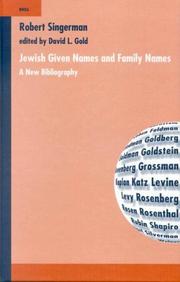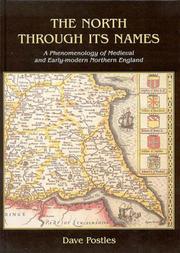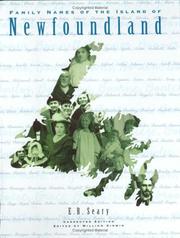| Listing 1 - 10 of 30 | << page >> |
Sort by
|
Book
ISBN: 3110709872 3110709597 Year: 2020 Publisher: Berlin/Boston De Gruyter
Abstract | Keywords | Export | Availability | Bookmark
 Loading...
Loading...Choose an application
- Reference Manager
- EndNote
- RefWorks (Direct export to RefWorks)
Die Regelungsdichte im deutschen Namensrecht nimmt beständig zu. Genügten dem Bürgerlichen Gesetzbuch in seiner Urfassung noch wenige kurze Paragraphen, haben die nachfolgenden Gesetzgeber das Recht der Personennamen beträchtlich aufgebläht. Die Vorschriften zum Geburtsnamen (§§ 1616 ff. BGB) sowie zum Ehe- und Begleitnamen (§ 1355 BGB) regeln die vermeintlich triviale Frage nach dem Familiennamen mit großer Liebe zum Detail. Der beeindruckende Normenbestand ist jedoch weit von einem in sich schlüssigen System entfernt. Es bedurfte immer wieder einer gesetzgeberischen Nachjustierung für Einzelkonstellationen - ein Indiz für einen grundlegenden Reformbedarf in diesem Rechtsgebiet. Anatol Dutta zeigt nicht nur die Ursachen für den Reformbedarf im Namensrecht auf, vor allem die Einschränkungen der traditionellen Funktionen des Namensrechts durch das Verfassungsrecht (Gleichheitssatz, Elternrecht und allgemeines Persönlichkeitsrecht) und das Unionsrecht (Personenfreizügigkeit und Diskriminierungsverbot). Er wirft auch einen Blick auf mögliche Grundzüge eines zeitgemäßen Namensrechts, das die Selbstdarstellungsfunktion des Namens und die Freiheit des Namensträgers in den Mittelpunkt rückt.
Naming law. --- birth names. --- double-barreled surnames. --- family law. --- married names. --- names. --- Family law

ISBN: 1280464828 9786610464821 1423705807 9047400992 9781423705802 9789047400998 9789004121898 9004121897 9781280464829 9004121897 Year: 2001 Publisher: Leiden ; Boston : Brill,
Abstract | Keywords | Export | Availability | Bookmark
 Loading...
Loading...Choose an application
- Reference Manager
- EndNote
- RefWorks (Direct export to RefWorks)
This work identifies and describes over 3000 books, essays in books, and articles on Jewish given names and family names throughout history, spanning the Biblical period to modern times.
Names, Personal --- Names in the Bible --- Anthroponomy --- Baby names --- Christian names --- Family names --- Forenames --- Names of families --- Names of persons --- Personal names --- Surnames --- Names --- Onomastics --- Jewish
Book
ISSN: 09383387 ISBN: 3110909448 9783110909449 3484555114 Year: 1998 Volume: 11 Publisher: Tubingen : Max Niemeyer Verlag,
Abstract | Keywords | Export | Availability | Bookmark
 Loading...
Loading...Choose an application
- Reference Manager
- EndNote
- RefWorks (Direct export to RefWorks)
Este volumen contiene las Actas del IX Coloquio PatRom, organizado por el centro PatRom de Uviéu/Oviedo en 1995, y en el que se intentó acercar a los investigadores europeos del proyecto PatRom al asturiano, romance situado en el norte de España entre el gallego y el castellano.
Names, Personal --- Anthroponomy --- Baby names --- Christian names --- Family names --- Forenames --- Names of families --- Names of persons --- Personal names --- Surnames --- Names --- Onomastics --- Roman --- Romance
Book
ISBN: 0761858989 9780761858980 9780761858973 0761858970 Year: 2012 Publisher: Lanham, Md. : University Press of America,
Abstract | Keywords | Export | Availability | Bookmark
 Loading...
Loading...Choose an application
- Reference Manager
- EndNote
- RefWorks (Direct export to RefWorks)
Schubert squarely addresses the question of whether there is a single standard of certainty that can be applied to such disparate areas as logic, mathematics, politics, religion, familial/tribal commitments, and science. The result is a new "philosophy in a grand manner" and a powerful ethical proposal for our time.
Certainty. --- Names, Personal. --- Anthroponomy --- Baby names --- Christian names --- Family names --- Forenames --- Names of families --- Names of persons --- Personal names --- Surnames --- Names --- Onomastics --- Indubitability --- Knowledge, Theory of --- Logic --- Truth

ISBN: 1782975519 1782975497 9781782975496 9781782975519 9781842171769 1842171763 1785709798 9781785709791 Year: 2007 Publisher: Oxford : Oxbow Books,
Abstract | Keywords | Export | Availability | Bookmark
 Loading...
Loading...Choose an application
- Reference Manager
- EndNote
- RefWorks (Direct export to RefWorks)
The North of England and northern-ness are elusive concepts, both academically and in popular perception. This volume in the English Surnames Survey series looks at what can be learned about the idea of the 'North' of England as a distinct identity from its surnames. The personal names from the north during the medieval/early modern period are linguistic phenomena, incorporating dialect speech that defined a northern consciousness, and in this way are an invaluable resource in exploring a northern identity. Dave Postles attempts to reconstruct the language of the speech community and communities of northern England through the reporting and recording of personal name elements, examining the evidence from patronyms, metronyms and personal names, as well as occupational bynames, and even nicknames. He identifies many distinctions including the longer continuity of insular personal names in the north which implies a cultural dissonance with the south perhaps in terms of a residual culture, but equally perhaps in terms of a resistant or oppositional culture. Since (what others might assume to be) insalubrious nickname bynames continued later in the north than in more southerly environments, northern speech through names could be represented as (by northerners) direct and (by southerners) uncivil.
Names, Personal --- Anthroponomy --- Baby names --- Christian names --- Family names --- Forenames --- Names of families --- Names of persons --- Personal names --- Surnames --- Names --- Onomastics --- History
Book

ISBN: 8490963061 8496820416 9788490963067 Year: 2020 Publisher: Madrid Casa de Velázquez
Abstract | Keywords | Export | Availability | Bookmark
 Loading...
Loading...Choose an application
- Reference Manager
- EndNote
- RefWorks (Direct export to RefWorks)
Les grands événements de l’époque moderne ont créé de nombreuses occasions de changer de nom et, en même temps, de fixer de nouvelles identités collectives par la création d’un patrimoine onomastique. La mobilité spatiale et sociale se trouve souvent au coeur des mécanismes de ces changements. Au travers des liens entre mobilité et anthroponymie, ce livre propose de nouvelles voies pour étudier l’histoire des noms. Los grandes acontecimientos del periodo moderno crearon numerosas ocasiones para cambiar de nombre y, a la vez, fijar identidades colectivas nuevas mediante la creación de un patrimonio onomástico. La movilidad espacial y social se encuentra con frecuencia en el corazón de los mecanismos de estos cambios. A través de los lazos existentes entre movilidad y antroponimia, este libro propone nuevas vías y numerosos instrumentos de análisis para estudiar la historia de los nombres. La situación de diversas regiones de Europa (Italia del norte, Mallorca, Navarra o Extremadura), el juego de los cambios onomásticos entre numerosos grupos de emigrantes (castellanos que han partido a las Indias, catalanes en Italia, irlandeses en Francia o en España), los efectos de la expansión europea sobre el dominio colonial (nombres del Inca, nombres de indígenas y de esclavos, nombres de soldados coloniales) son los principales temas examinados en el presente libro.
Names, Personal --- Social aspects. --- Anthroponomy --- Baby names --- Christian names --- Family names --- Forenames --- Names of families --- Names of persons --- Personal names --- Surnames --- Names --- Onomastics
Book
ISBN: 1496232070 Year: 2022 Publisher: Lincoln, Nebraska : University of Nebraska Press,
Abstract | Keywords | Export | Availability | Bookmark
 Loading...
Loading...Choose an application
- Reference Manager
- EndNote
- RefWorks (Direct export to RefWorks)
"Apart from collective memories of lived experiences, much of the modern world's historical sense comes from written sources stored in the archives of the world, and some scholars in the not-so-distant past have described unlettered civilizations as "peoples without history." In Praise of the Ancestors is a revisionist interpretation of early colonial accounts that reveal incongruities in accepted knowledge about three Native groups. Susan Elizabeth Ramírez reevaluates three case studies of oral traditions using positional inheritance-a system in which names and titles are inherited from one generation by another and thereby contribute to the formation of collective memories and a group identity. Ramírez begins by examining positional inheritance and perpetual kinship among the Kazembes in central Africa from the eighteenth to the mid-twentieth centuries. Next, her analysis moves to the Native groups of the Iroquois Confederation and their practice of using names to memorialize remarkable leaders in the seventeenth and eighteenth centuries. Finally, Ramírez surveys naming practices of the Andeans, based on sixteenth-century manuscript sources and later testimonies found in Spanish and Andean archives, questioning colonial narratives by documenting the use of this alternative system of memory perpetuation, which was initially unrecognized by the Spaniards. In the process of reexamining the histories of Native peoples on three continents, Ramírez broaches a wider issue: namely, understanding of the nature of knowledge as fundamental to understanding and evaluating the knowledge itself. "-- "In Praise of the Ancestors is a revisionist interpretation of early colonial accounts and sources that reveal incongruities in accepted knowledge among the Indigenous peoples of sub-Saharan Africa, the North American Great Lakes regions, and the Andes"--
Names, Personal --- Luba-Lulua --- Anthroponomy --- Baby names --- Christian names --- Family names --- Forenames --- Names of families --- Names of persons --- Personal names --- Surnames --- Names --- Onomastics
Book
ISBN: 3653041880 3653992974 Year: 2014 Publisher: Bern Peter Lang International Academic Publishing Group
Abstract | Keywords | Export | Availability | Bookmark
 Loading...
Loading...Choose an application
- Reference Manager
- EndNote
- RefWorks (Direct export to RefWorks)
Die Familiennamen im Gebiet zwischen den Fluessen Maas und Rhein stellen infolge der komplexen politisch-historischen Grenzziehungen und durch ihre Lage in der Kontaktzone zwischen Germania und Romania eine besonders vielfaeltige Quelle fuer die Namenforschung dar. Der Band umfasst komparative und systematische Beitraege zu den Familiennamenlandschaften in den Grenzregionen von Luxemburg, Belgien, Deutschland und Frankreich, die aus sprachhistorischen, kontaktlinguistischen und kartographischen Perspektiven beleuchtet werden. Diese Artikelsammlung richtet sich damit sowohl an Sprachhistoriker
Names, Personal --- Anthroponomy --- Baby names --- Christian names --- Family names --- Forenames --- Names of families --- Names of persons --- Personal names --- Surnames --- Names --- Onomastics --- Meuse River Region --- Rhine River Region --- History. --- Linguistics --- Literature: history and criticism

ISBN: 1282855263 9786612855269 0773567410 9780773567412 0773517820 9780773517820 Year: 1998 Publisher: St. John's : Montreal & Kingston : J.R. Smallwood Center for Newfoundland Studies, Memorial University of Newfoundland ; McGill-Queen's University Press,
Abstract | Keywords | Export | Availability | Bookmark
 Loading...
Loading...Choose an application
- Reference Manager
- EndNote
- RefWorks (Direct export to RefWorks)
Byrne, Chaffey, Fahey, Fizzard, Fudge, Grouchy, Hynes, Inkpen, Lyver, McLaughlin, Miles, Murphy, Puddester, Quirk -- the names themselves are evocative of Newfoundland. Family Names of the Island of Newfoundland traces the origins of almost 3,000 surnames found on the Island and provides an engaging and comprehensive collection of etymology, genealogy, and Newfoundland history. The introduction presents a fascinating discussion of the history and linguistic origins of surnames found in Newfoundland, which come from many different cultures, notably English, Welsh, Irish, Scottish, French, Syrian, Lebanese, and Mi'kmaq. The main body of the book comprises a dictionary of surnames in the province based on data collected from provincial voting lists, family records, government documents, and newspaper reports dating back to the seventeenth century. Each entry includes variant spellings and cross-references of the surname, the countries in which the name originated, and its meaning. Newfoundland place names associated with the surname are also given. The book also includes a ranking of the most common surnames in Newfoundland and a comparative analysis of the frequency of surnames in Scotland, Ireland, England, and Newfoundland. Originally published in 1977, Family Names of the Island of Newfoundland is a unique reference work, giving Newfoundlanders, both in the province and away, a fascinating look at their roots. This edition incorporates a number of additions and corrections and has been completely reset in a sturdier and more convenient format. It will be of great use to individuals tracing their ancestors and to genealogists researching early settlers in Newfoundland.
Names, Personal --- Anthroponomy --- Baby names --- Christian names --- Family names --- Forenames --- Names of families --- Names of persons --- Personal names --- Surnames --- Names --- Onomastics --- Newfoundland, Island of (N.L.) --- Island of Newfoundland (N.L.) --- Newfoundland, Island of (Nfld.)
Book
ISBN: 1282296396 9786612296390 3484971452 9783484971455 3484507012 Year: 2007 Publisher: Tubingen : Niemeyer,
Abstract | Keywords | Export | Availability | Bookmark
 Loading...
Loading...Choose an application
- Reference Manager
- EndNote
- RefWorks (Direct export to RefWorks)
Le »Dictionnaire historique de l'anthroponymie romane« présente, sous forme d'articles du type de ceux des grands dictionnaires étymologiques de langue (»FEW«, »LEI«), les noms de personne issus de lexèmes, depuis la période médiévale jusqu'à nos jours, selon une classification pertinente établie au sein du projet. Les étymons sont des éléments du lexique (restriction imposée au détriment des noms de famille issus de toponymes et de noms de baptême) qui sont productifs dans au moins deux des quatre superdomaines linguistiques (Ibéroromania, Galloromania, Italoromania, domaine roumain). Un premier volume du dictionnaire, consacré aux étymons relatifs à une partie du corps humain (Volume II/1), a paru précédemment en 2004. Le présent volume s'ouvre par une introduction au projet PatRom (D. Kremer) et une présentation davantage centré sur le dictionnaire lui-même (A. Cano et B. Schmid). Suit le ›Cahier des normesrédactionnelle‹, particulièrement précis et original, rédigé sous la direction de E. Buchi, fournissant une double grille de classement géographique des nombreux matériaux (grille géo-linguistique pour les noms de personnes anciens, grille géo-administrative pour les noms de famille contemporains). La méthode de classement et d'analyse morphologique des noms de personne par rapport à l'étymon est exposée par N. Weinhold; sont jointes les bases étymologiques des préfixes et surtout des suffixes. Diverses bibliographies coordonnées par C. Maas-Chauveau présentent les principaux travaux d'onomastique (anthroponymie et toponymie) et de lexicographie romanes utilisés lors de la rédaction du dictionnaire; ces bibliographies sont doublées par des index par sigles. Ne manquent plus que les bibliographies des sources pour disposer de toutes les clés nécessaires à l'utilisation et à la compréhension du dictionnaire PatRom, dont un prochain volume devrait paraître en 2007.
Names, Personal --- Romance languages --- Romance personal names --- Anthroponomy --- Baby names --- Christian names --- Family names --- Forenames --- Names of families --- Names of persons --- Personal names --- Surnames --- Names --- Onomastics --- Roman. --- Romance. --- Etymology --- Names.
| Listing 1 - 10 of 30 | << page >> |
Sort by
|

 Search
Search Feedback
Feedback About UniCat
About UniCat  Help
Help News
News